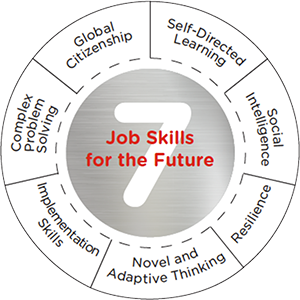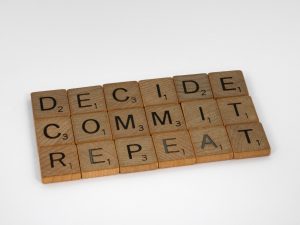1.3 Why College? What’s in it for You?
Video: University Degrees vs College Degrees
Video: “University Degrees vs College Degrees” by Fanshawe College [2:40] Transcript Available.

When asked, most students say they’re in school primarily for the job or career they expect to follow after they get their certificate, diploma, trade, or degree. They are correct that education pays off enormously in terms of future earnings, job security and stability, and job satisfaction. Every statistic shows that people with a post-secondary education will make much more in their lifetime on average (much, much more than the cost of schooling itself) and be much happier with the work they do.
Many of your classes are designed to give you the technical skills required to compete in this rapidly changing job market. These are the types of skills you may see listed on a job posting and might include, understanding the biology, physiology and chemistry of the human body, using health-sciences and other health-related terminology, good communication skills, or good time management.
A 2022 poll of 1000 Canadian employers identified that almost 80 per cent see value in hiring someone based on their “soft skills” including their adaptability, attention to detail and positive attitude toward learning rather than specific job-related knowledge and technical skills.
According to Michelle Slater (2022), director at Indeed, Canadian employers care more deeply about what the person can contribute to the team in terms of their attitudes versus what skills they have that they’re bringing into the role.
Student Perspective
“Of the students in the Nursing program, those of use who have taken Pre-Health Science find the course so much easier than those students who did not take Pre-Health Science.”
First-year nursing student – Fanshawe College
This textbook has been created to provide you with the opportunity to self-assess your current “soft skills”; identify opportunities to strengthen them and provide ways to take action now, while at college to develop them further.

Why Focus on “Soft Skills”?
The job market is ever changing!
- A 2022 survey of 1,000 Canadian businesses identified that in a tight or competitive job market, employers may not be able to hire externally. Instead, they are identifying those with the soft skills who could be trained on the hard skills and step quickly into a much needed position (Slater, 2022).
- COVID impacted the way we do business and the current work from home, hybrid work models rely on being adaptable, resilient, learning on your own, and complex problems solving using your your social intelligence by connecting and communicating through a screen.
Fanshawe College has identified 7 Job Skills for the Future that you will be encouraged to develop throughout your time at Fanshawe. You will learn more about this in Chapter 3: Job Skills.
How This Course Helps You Succeed
There are a lot of things that have to come together for you to be successful and it’s important to recognize that some students do not succeed, and drop out within the first year.
Sometimes it’s due to an unsolvable financial problem or a personal or family crisis, but the most likely reasons that a student in Canada will drop out include an ineffective social network (not getting involved in extra-curricular and volunteering opportunities), a lack of academic abilities, and poor attitudes and habits towards post-secondary education (Ma & Frempong, 2008).
Everyone will have their own experiences, strengths and areas they want to improve. Throughout the textbook, you will have the chance to reflect on who you are now and areas you can improve, and each chapter will identify Fanshawe resources that you can connect with to help you develop your social, academic, and wellness supports.
Listen and watch as Francisco Munoz Arguello talks about his experience and why he chose to move to a new country and go back to school with his family.
Video: This is COMMUNITY
Video: This is COMMUNITY by Fanshawe College [2:39] Transcript Available.
The first half of this textbook, you’ll have the opportunity to learn more about the Pre-Health Science program and the various career pathways available to you after completing the program. You’ll even hear from some professionals in the field about their career and the learning journey that brought them to where they are today.
The second half of the text, you’ll have the opportunity to develop your skills in listening, reading, remembering, decision making, communication, taking notes and studying in ways that use your time efficiently and help you pass tests, and academic integrity.

Some of the things you’ll read about here involve ideas you’ll need to think about. Some things will help you get to know yourself better, and understand more clearly what you really want from your education and how to go about attaining it.
However, if you care enough to want to succeed in school, and read these chapters and try to use the information, suggestions, and tips presented here, you will succeed in your educational goals.
Being successful as a student doesn’t happen by accident. It takes commitment, focus, and effort. There are skills and methods to be successful which can be learned and practiced. It all starts with taking stock of where you are now.
Throughout this text you will have the opportunity to work on and develop skills in many of the areas you have identified above that will impact your student success. Some topics are specific to post-secondary while others will be useful in life in general, such as communication skills, time management. Hopefully this resource will give you many valuable skills going forward.
Detailed learning outcomes for each topic can be found in the introductions to each module.
“1.2 Why College? What’s in it for You?” from Fanshawe SOAR by Kristen Cavanagh is licensed under a Creative Commons Attribution-NonCommercial-ShareAlike 4.0 International License, except where otherwise noted.

